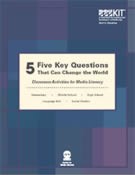CML Publishes Start-up Curriculum for K-12 Media Literacy
|
|
25 Lesson Plans Help Students Explore Five Key Questions of Media Literacy
LOS ANGELES, CA, September 30, 2005 – "Where do I start?" is a cry often heard from teachers who would like to introduce media literacy in their classrooms, kindergarten to high school, but lack the tools to do so.
Now, a pioneering leader in media literacy has published a ground-breaking solution that provides an entry point for students of all ages to learn and master the basic principles of the field.
Five Key Questions That Can Change the World, developed by the Los Angeles-based Center for Media Literacy (CML), is an innovative collection of 25 cornerstone classroom activities and lesson plans. Five activities are provided for each of the Five Key Questions of media literacy that are the foundation of CML's educational framework, the CML MediaLit Kit ™.
"Children growing up in today's 21st century media culture need to know more than how to simply analyze an ad," said CML's founder, Elizabeth Thoman, who edited the guide. "They need to internalize a fundamental critical and creative thinking process that will help them make decisions about their use of media throughout their lives."
The lessons are available on the CML website: www.medialit.net . "We're thrilled to be offering this valuable tool kit to teachers as a free download," added Thoman.
Unlike other media literacy classroom resources, which typically are organized by genre (news, advertising, etc.) or topic (violence, gender, etc.), the inquiry-based lessons connect the Five Key Questions to any and all media content. Each question flows from a corresponding Core Concept and provides an entrée into exploring the multiple facets of any media message. The Five Key Questions are:
• Who created this message?
• What creative techniques are used to attract my attention?
• How might different people understand this message differently from me?
• What lifestyles, values and points of view are represented in, or omitted from, this message?
• Why is this message being sent?
Applied across the curriculum, from language arts to social studies, from science to art, "the Five Key Questions allow teachers to introduce core skills of critical thinking, analysis and evaluation along with the creative communication skills so necessary in a global media culture," explained Tessa Jolls , president of CML. Jolls' " Words of Wisdom" for classroom implementation are featured in the resource as guidelines to newcomers in the field of media literacy.
" ‘ Five Key Questions That Can Change the World' gives educators all the tools they need to teach media literacy, and are engaging for students of any age," said CML's Jeff Share, who designed and wrote the classroom activities. The 25 lessons cover a variety of content topics and explore a mix of media formats, from newspapers and magazines to television, movies, the Internet, radio, and even maps and money.
"It is our dream that by the time they graduate from high school, all students will be able to apply the Five Key Questions , almost without thinking," noted Jolls. "Practicing and mastering the Five Key Questions leads to an adult understanding of how media are created, what their purposes are, and how to accept or reject their messages."
Five Key Questions That Can Change the World complements two other CML publications, Literacy for the 21 st Century: An Orientation Guide to Media Literacy and Media Literacy Works!: A Case Study in Elementary Media Literacy and the Arts. Together, they form a trilogy that covers theory, practice and implementation – all the necessary ingredients for introducing media literacy into preK-12 classrooms.
Based on the work of media literacy scholars and teachers over 20 years, the trilogy of publications constitutes the CML MediaLit Kit™ and is also available at www.medialit.net.
The Center for Media Literacy (CML) is a nonprofit educational organization that provides leadership, public education, professional development and educational resources nationally. Dedicated to the development and dissemination of a consistent and credible media literacy educational framework, CML works to help citizens, especially the young, gain the critical thinking and media production skills needed to live fully in the 21st century media culture. The ultimate goal is to make wise choices possible.
Incorporated in 1989, CML is an independent, nonpartisan 501(c)(3) nonprofit organization.



